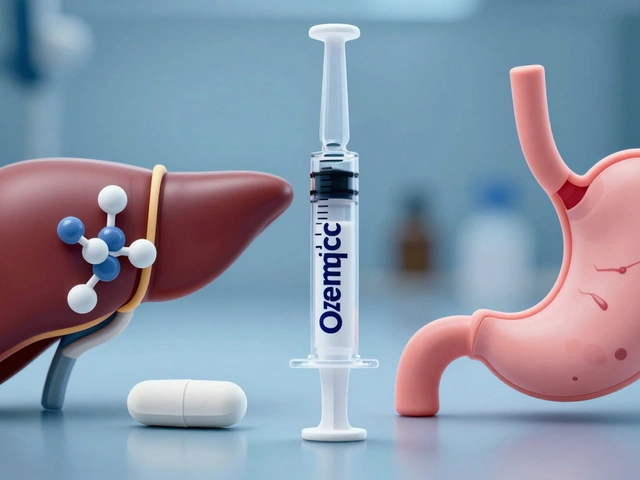Side Effects: What Every Medicine User Should Know
If you’ve ever felt a weird rash or sudden dizziness after a new pill, you’ve experienced a side effect. They’re not always scary, but ignoring them can turn a mild issue into a big problem. In India, the sheer variety of drugs—from Ayurvedic mixes to modern antibiotics—means staying alert is a must. Below we break down the basics so you can protect yourself without needing a medical degree.
Common Side Effects You Might Notice
Most people first notice skin changes: itchy patches, red spots, or mild swelling. These often happen with antibiotics or anti‑inflammatory drugs. Stomach upset—nausea, cramps, or diarrhea—is another frequent complaint, especially after antibiotics, NSAIDs, or iron supplements. Headaches and dizziness pop up with blood pressure meds, antihistamines, and some painkillers. If you’re on diabetes drugs like metformin, you might feel a metallic taste or mild gas. Recognising the pattern—what you took, when the symptom started—helps you decide if it’s worth a doctor’s call.
How to Handle and Report Side Effects
First, stop the medication only if the reaction feels severe (like trouble breathing, swelling of the face, or a rapid heartbeat). For milder issues, try taking the drug with food, switching to a different brand, or adjusting the dose after consulting a pharmacist. Keep a simple log: date, drug name, dose, and what happened. This makes it easier for your doctor to spot trends.
In India, you can report adverse reactions to the Central Drugs Standard Control Organization (CDSCO) via their online portal or call the helpline. Reporting isn’t just paperwork; it helps regulators flag risky batches and protect other patients. If you’re using an Ayurvedic or herbal product, the same rule applies—natural doesn’t always mean safe.
Never rely on internet forums alone. While they’re good for ideas, only a qualified health professional can tell if you need a different drug or an emergency visit. If you’re unsure, call your local clinic, show your log, and ask for a quick check.
Finally, talk to your pharmacist before starting any new medicine, especially if you already take several drugs. They can spot potential interactions that cause side effects like increased drowsiness or heart palpitations. A short conversation at the counter can save you weeks of discomfort.
Bottom line: side effects are common, but they don’t have to be a mystery. Spot the signs early, keep a quick record, and reach out to a professional. Staying proactive means you get the benefits of your treatment without the unwanted surprises.

Is It Safe to Take Herbal Supplements? What You Need to Know Before You Start
Herbal supplements may seem safe because they're natural, but they can interact with medications, cause side effects, or even harm your liver. Learn what's truly safe-and what to avoid-before you take them.

Hardest Days After Chemo: What to Expect and How to Cope
Chemo hits everyone differently, but there’s a pattern to the hardest days. This article breaks down when the toughest side effects usually hit after chemo, what people actually feel, and why. Get real, actionable advice on handling nausea, fatigue, and mood swings. Learn which days tend to be the roughest and what you can do to make it through. Each section is loaded with simple tips to help you or your loved one feel more in control after treatment.

Why Is Metformin So Bad to Take? The Real Story on the Most Common Diabetes Pill
Metformin has a reputation for being both helpful and hard to tolerate. This article breaks down why so many people complain about metformin, from the annoying side effects to long-term risks. You'll get straightforward answers, real-life tips, and a clearer idea of what you can expect if your doctor suggests it. We’ll also talk about who really shouldn’t take it and when to push for an alternative. Just the facts, not the fluff.

Does Metformin Cause Weight Loss? The Real Story Behind This Diabetes Med
Metformin is a medication often used for type 2 diabetes, but lots of people wonder if it really helps with weight loss. This article breaks down what metformin actually does, how it affects your body weight, and who might see results. Find out why doctors prescribe it, what you should watch out for, and tips for managing your health while taking it. We’ll also cover common myths and practical advice you can actually use.

What Organ Is Metformin Hard On? Know the Real Risks
Metformin is one of the most popular medications for type 2 diabetes, but many people worry about which organ it might harm. This article explains how metformin works in the body, focuses on the main organ it affects, and gives practical ways to protect your health while taking it. Find out what the real risks are, what the latest research says, and how to spot problems early. You'll also pick up useful tips for safer metformin use. Stay informed and take control of your diabetes treatment.

Best Mail-Order Pharmacies: Who's Leading the Pack?
Mar, 19 2025

New Drug Revolutionizing Type 2 Diabetes Treatment
Feb, 20 2025

Discover 5 Essential Herbal Supplements for Wellness
Nov, 24 2024

